- Home
- Joseph Heller
Catch-22
Catch-22 Read online
Catch-22
Catch-22
Catch-22
Catch-22
Catch-22
by Joseph Heller
Catch-22
The Texan
It was love at first sight.
The first time Yossarian saw the chaplain he fell madly in love with him.
Yossarian was in the hospital with a pain in his liver that fell just short of being jaundice. The doctors were puzzled by the fact that it wasn't quite jaundice. If it became jaundice they could treat it. If it didn't become jaundice and went away they could discharge him. But this just being short of jaundice all the time confused them.
Each morning they came around, three brisk and serious men with efficient mouths and inefficient eyes, accompanied by brisk and serious Nurse Duckett, one of the ward nurses who didn't like Yossarian. They read the chart at the foot of the bed and asked impatiently about the pain. They seemed irritated when he told them it was exactly the same.
'Still no movement?' the full colonel demanded.
The doctors exchanged a look when he shook his head.
'Give him another pill.' Nurse Duckett made a note to give Yossarian another pill, and the four of them moved along to the next bed. None of the nurses liked Yossarian. Actually, the pain in his liver had gone away, but Yossarian didn't say anything and the doctors never suspected. They just suspected that he had been moving his bowels and not telling anyone.
Yossarian had everything he wanted in the hospital. The food wasn't too bad, and his meals were brought to him in bed. There were extra rations of fresh meat, and during the hot part of the afternoon he and the others were served chilled fruit juice or chilled chocolate milk. Apart from the doctors and the nurses, no one ever disturbed him. For a little while in the morning he had to censor letters, but he was free after that to spend the rest of each day lying around idly with a clear conscience. He was comfortable in the hospital, and it was easy to stay on because he always ran a temperature of 101. He was even more comfortable than Dunbar, who had to keep falling down on his face in order to get his meals brought to him in bed.
After he had made up his mind to spend the rest of the war in the hospital, Yossarian wrote letters to everyone he knew saying that he was in the hospital but never mentioning why. One day he had a better idea. To everyone he knew he wrote that he was going on a very dangerous mission. 'They asked for volunteers. It's very dangerous, but someone has to do it. I'll write you the instant I get back.' And he had not written anyone since.
All the officer patients in the ward were forced to censor letters written by all the enlisted-men patients, who were kept in residence in wards of their own. It was a monotonous job, and Yossarian was disappointed to learn that the lives of enlisted men were only slightly more interesting than the lives of officers. After the first day he had no curiosity at all. To break the monotony he invented games. Death to all modifiers, he declared one day, and out of every letter that passed through his hands went every adverb and every adjective. The next day he made war on articles. He reached a much higher plane of creativity the following day when he blacked out everything in the letters but a, an and the. That erected more dynamic intralinear tensions, he felt, and in just about every case left a message far more universal. Soon he was proscribing parts of salutations and signatures and leaving the text untouched. One time he blacked out all but the salutation 'Dear Mary' from a letter, and at the bottom he wrote, 'I yearn for you tragically. R. O. Shipman, Chaplain, U.S. Army.' R.O. Shipman was the group chaplain's name.
When he had exhausted all possibilities in the letters, he began attacking the names and addresses on the envelopes, obliterating whole homes and streets, annihilating entire metropolises with careless flicks of his wrist as though he were God. Catch-22 required that each censored letter bear the censoring officer's name. Most letters he didn't read at all. On those he didn't read at all he wrote his own name. On those he did read he wrote, 'Washington Irving.' When that grew monotonous he wrote, 'Irving Washington.' Censoring the envelopes had serious repercussions, produced a ripple of anxiety on some ethereal military echelon that floated a C.I.D. man back into the ward posing as a patient. They all knew he was a C.I.D. man because he kept inquiring about an officer named Irving or Washington and because after his first day there he wouldn't censor letters. He found them too monotonous.
It was a good ward this time, one of the best he and Dunbar had ever enjoyed. With them this time was the twenty-four-year-old fighter-pilot captain with the sparse golden mustache who had been shot into the Adriatic Sea in midwinter and not even caught cold. Now the summer was upon them, the captain had not been shot down, and he said he had the grippe. In the bed on Yossarian's right, still lying amorously on his belly, was the startled captain with malaria in his blood and a mosquito bite on his ass. Across the aisle from Yossarian was Dunbar, and next to Dunbar was the artillery captain with whom Yossarian had stopped playing chess. The captain was a good chess player, and the games were always interesting. Yossarian had stopped playing chess with him because the games were so interesting they were foolish. Then there was the educated Texan from Texas who looked like someone in Technicolor and felt, patriotically, that people of means--decent folk--should be given more votes than drifters, whores, criminals, degenerates, atheists and indecent folk--people without means.
Yossarian was unspringing rhythms in the letters the day they brought the Texan in. It was another quiet, hot, untroubled day. The heat pressed heavily on the roof, stifling sound. Dunbar was lying motionless on his back again with his eyes staring up at the ceiling like a doll's. He was working hard at increasing his life span. He did it by cultivating boredom. Dunbar was working so hard at increasing his life span that Yossarian thought he was dead. They put the Texan in a bed in the middle of the ward, and it wasn't long before he donated his views.
Dunbar sat up like a shot. 'That's it,' he cried excitedly. 'There was something missing--all the time I knew there was something missing--and now I know what it is.' He banged his fist down into his palm. 'No patriotism,' he declared.
'You're right,' Yossarian shouted back. 'You're right, you're right, you're right. The hot dog, the Brooklyn Dodgers. Mom's apple pie. That's what everyone's fighting for. But who's fighting for the decent folk? Who's fighting for more votes for the decent folk? There's no patriotism, that's what it is. And no matriotism, either.' The warrant officer on Yossarian's left was unimpressed. 'Who gives a shit?' he asked tiredly, and turned over on his side to go to sleep.
The Texan turned out to be good-natured, generous and likable. In three days no one could stand him.
He sent shudders of annoyance scampering up ticklish spines, and everybody fled from him--everybody but the soldier in white, who had no choice. The soldier in white was encased from head to toe in plaster and gauze. He had two useless legs and two useless arms. He had been smuggled into the ward during the night, and the men had no idea he was among them until they awoke in the morning and saw the two strange legs hoisted from the hips, the two strange arms anchored up perpendicularly, all four limbs pinioned strangely in air by lead weights suspended darkly above him that never moved. Sewn into the bandages over the insides of both elbows were zippered lips through which he was fed clear fluid from a clear jar. A silent zinc pipe rose from the cement on his groin and was coupled to a slim rubber hose that carried waste from his kidneys and dripped it efficiently into a clear, stoppered jar on the floor. When the jar on the floor was full, the jar feeding his elbow was empty, and the two were simply switched quickly so that the stuff could drip back into him. All they ever really saw of the soldier in white was a frayed black hole over his mouth.
The soldier in white had been filed next to the Texan, and the Texan sat sideways on his own be
d and talked to him throughout the morning, afternoon and evening in a pleasant, sympathetic drawl. The Texan never minded that he got no reply.
Temperatures were taken twice a day in the ward. Early each morning and late each afternoon Nurse Cramer entered with a jar full of thermometers and worked her way up one side of the ward and down the other, distributing a thermometer to each patient. She managed the soldier in white by inserting a thermometer into the hole over his mouth and leaving it balanced there on the lower rim. When she returned to the man in the first bed, she took his thermometer and recorded his temperature, and then moved on to the next bed and continued around the ward again. One afternoon when she had completed her first circuit of the ward and came a second time to the soldier in white, she read his thermometer and discovered that he was dead.
'Murderer,' Dunbar said quietly.
The Texan looked up at him with an uncertain grin.
'Killer,' Yossarian said.
'What are you fellas talkin' about?' the Texan asked nervously.
'You murdered him,' said Dunbar.
'You killed him,' said Yossarian.
The Texan shrank back. 'You fellas are crazy. I didn't even touch him.'
'You murdered him,' said Dunbar.
'I heard you kill him,' said Yossarian.
'You killed him because he was a nigger,' Dunbar said.
'You fellas are crazy,' the Texan cried. 'They don't allow niggers in here. They got a special place for niggers.'
'The sergeant smuggled him in,' Dunbar said.
'The Communist sergeant,' said Yossarian.
'And you knew it.' The warrant officer on Yossarian's left was unimpressed by the entire incident of the soldier in white. The warrant officer was unimpressed by everything and never spoke at all unless it was to show irritation.
The day before Yossarian met the chaplain, a stove exploded in the mess hall and set fire to one side of the kitchen. An intense heat flashed through the area. Even in Yossarian's ward, almost three hundred feet away, they could hear the roar of the blaze and the sharp cracks of flaming timber. Smoke sped past the orange-tinted windows. In about fifteen minutes the crash trucks from the airfield arrived to fight the fire. For a frantic half hour it was touch and go. Then the firemen began to get the upper hand. Suddenly there was the monotonous old drone of bombers returning from a mission, and the firemen had to roll up their hoses and speed back to the field in case one of the planes crashed and caught fire. The planes landed safely. As soon as the last one was down, the firemen wheeled their trucks around and raced back up the hill to resume their fight with the fire at the hospital. When they got there, the blaze was out. It had died of its own accord, expired completely without even an ember to be watered down, and there was nothing for the disappointed firemen to do but drink tepid coffee and hang around trying to screw the nurses.
The chaplain arrived the day after the fire. Yossarian was busy expurgating all but romance words from the letters when the chaplain sat down in a chair between the beds and asked him how he was feeling. He had placed himself a bit to one side, and the captain's bars on the tab of his shirt collar were all the insignia Yossarian could see. Yossarian had no idea who he was and just took it for granted that he was either another doctor or another madman.
'Oh, pretty good,' he answered. 'I've got a slight pain in my liver and I haven't been the most regular of fellows, I guess, but all in all I must admit that I feel pretty good.'
'That's good,' said the chaplain.
'Yes,' Yossarian said. 'Yes, that is good.'
'I meant to come around sooner,' the chaplain said, 'but I really haven't been well.'
'That's too bad,' Yossarian said.
'Just a head cold,' the chaplain added quickly.
'I've got a fever of a hundred and one,' Yossarian added just as quickly.
'That's too bad,' said the chaplain.
'Yes,' Yossarian agreed. 'Yes, that is too bad.' The chaplain fidgeted. 'Is there anything I can do for you?' he asked after a while.
'No, no.' Yossarian sighed. 'The doctors are doing all that's humanly possible, I suppose.'
'No, no.' The chaplain colored faintly. 'I didn't mean anything like that. I meant cigarettes... or books... or... toys.'
'No, no,' Yossarian said. 'Thank you. I have everything I need, I suppose--everything but good health.'
'That's too bad.'
'Yes,' Yossarian said. 'Yes, that is too bad.' The chaplain stirred again. He looked from side to side a few times, then gazed up at the ceiling, then down at the floor. He drew a deep breath.
'Lieutenant Nately sends his regards,' he said.
Yossarian was sorry to hear they had a mutual friend. It seemed there was a basis to their conversation after all. 'You know Lieutenant Nately?' he asked regretfully.
'Yes, I know Lieutenant Nately quite well.'
'He's a bit loony, isn't he?' The chaplain's smile was embarrassed. 'I'm afraid I couldn't say. I don't think I know him that well.'
'You can take my word for it,' Yossarian said. 'He's as goofy as they come.' The chaplain weighed the next silence heavily and then shattered it with an abrupt question. 'You are Captain Yossarian, aren't you?'
'Nately had a bad start. He came from a good family.'
'Please excuse me,' the chaplain persisted timorously. 'I may be committing a very grave error. Are you Captain Yossarian?'
'Yes,' Captain Yossarian confessed. 'I am Captain Yossarian.'
'Of the 256th Squadron?'
'Of the fighting 256th Squadron,' Yossarian replied. 'I didn't know there were any other Captain Yossarians. As far as I know, I'm the only Captain Yossarian I know, but that's only as far as I know.'
'I see,' the chaplain said unhappily.
'That's two to the fighting eighth power,' Yossarian pointed out, 'if you're thinking of writing a symbolic poem about our squadron.'
'No,' mumbled the chaplain. 'I'm not thinking of writing a symbolic poem about your squadron.' Yossarian straightened sharply when he spied the tiny silver cross on the other side of the chaplain's collar. He was thoroughly astonished, for he had never really talked with a chaplain before.
'You're a chaplain,' he exclaimed ecstatically. 'I didn't know you were a chaplain.'
'Why, yes,' the chaplain answered. 'Didn't you know I was a chaplain?'
'Why, no. I didn't know you were a chaplain.' Yossarian stared at him with a big, fascinated grin. 'I've never really seen a chaplain before.' The chaplain flushed again and gazed down at his hands. He was a slight man of about thirty-two with tan hair and brown diffident eyes. His face was narrow and rather pale. An innocent nest of ancient pimple pricks lay in the basin of each cheek. Yossarian wanted to help him.
'Can I do anything at all to help you?' the chaplain asked.
Yossarian shook his head, still grinning. 'No, I'm sorry. I have everything I need and I'm quite comfortable. In fact, I'm not even sick.'
'That's good.' As soon as the chaplain said the words, he was sorry and shoved his knuckles into his mouth with a giggle of alarm, but Yossarian remained silent and disappointed him. 'There are other men in the group I must visit,' he apologized finally. 'I'll come to see you again, probably tomorrow.'
'Please do that,' Yossarian said.
'I'll come only if you want me to,' the chaplain said, lowering his head shyly. 'I've noticed that I make many of the men uncomfortable.' Yossarian glowed with affection. 'I want you to,' he said. 'You won't make me uncomfortable.' The chaplain beamed gratefully and then peered down at a slip of paper he had been concealing in his hand all the while. He counted along the beds in the ward, moving his lips, and then centered his attention dubiously on Dunbar.
'May I inquire,' he whispered softly, 'if that is Lieutenant Dunbar?'
'Yes,' Yossarian answered loudly, 'that is Lieutenant Dunbar.'
'Thank you,' the chaplain whispered. 'Thank you very much. I must visit with him. I must visit with every member of the group who is in the hospital.'
'Even those in other wards?' Yossarian asked.
'Even those in other wards.'
'Be careful in those other wards, Father,' Yossarian warned. 'That's where they keep the mental cases. They're filled with lunatics.'
'It isn't necessary to call me Father,' the chaplain explained. 'I'm an Anabaptist.'
'I'm dead serious about those other wards,' Yossarian continued grimly. 'M.P.s won't protect you, because they're craziest of all. I'd go with you myself, but I'm scared stiff: Insanity is contagious. This is the only sane ward in the whole hospital. Everybody is crazy but us. This is probably the only sane ward in the whole world, for that matter.' The chaplain rose quickly and edged away from Yossarian's bed, and then nodded with a conciliating smile and promised to conduct himself with appropriate caution. 'And now I must visit with Lieutenant Dunbar,' he said. Still he lingered, remorsefully. 'How is Lieutenant Dunbar?' he asked at last.
'As good as they go,' Yossarian assured him. 'A true prince. One of the finest, least dedicated men in the whole world.'
'I didn't mean that,' the chaplain answered, whispering again. 'Is he very sick?'
'No, he isn't very sick. In fact, he isn't sick at all.'
'That's good.' The chaplain sighed with relief.
'Yes,' Yossarian said. 'Yes, that is good.'
'A chaplain,' Dunbar said when the chaplain had visited him and gone. 'Did you see that? A chaplain.'
'Wasn't he sweet?' said Yossarian. 'Maybe they should give him three votes.'
'Who's they?' Dunbar demanded suspiciously.
In a bed in the small private section at the end of the ward, always working ceaselessly behind the green plyboard partition, was the solemn middle-aged colonel who was visited every day by a gentle, sweet-faced woman with curly ash-blond hair who was not a nurse and not a Wac and not a Red Cross girl but who nevertheless appeared faithfully at the hospital in Pianosa each afternoon wearing pretty pastel summer dresses that were very smart and white leather pumps with heels half high at the base of nylon seams that were inevitably straight. The colonel was in Communications, and he was kept busy day and night transmitting glutinous messages from the interior into square pads of gauze which he sealed meticulously and delivered to a covered white pail that stood on the night table beside his bed. The colonel was gorgeous. He had a cavernous mouth, cavernous cheeks, cavernous, sad, mildewed eyes. His face was the color of clouded silver. He coughed quietly, gingerly, and dabbed the pads slowly at his lips with a distaste that had become automatic.

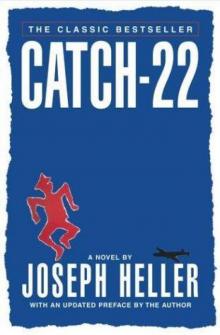 Catch-22
Catch-22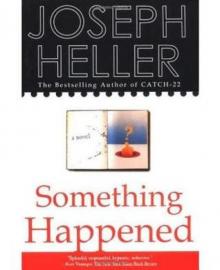 Something Happened
Something Happened God Knows
God Knows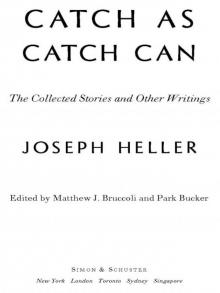 Catch As Catch Can
Catch As Catch Can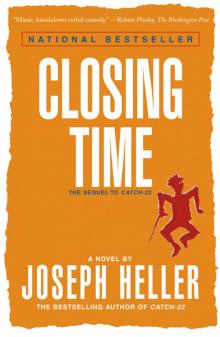 Closing Time
Closing Time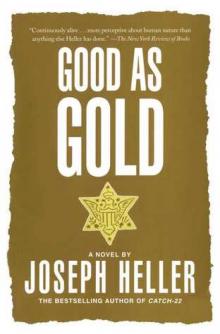 Good as Gold
Good as Gold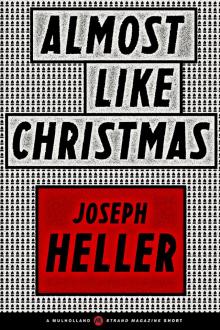 Almost Like Christmas
Almost Like Christmas